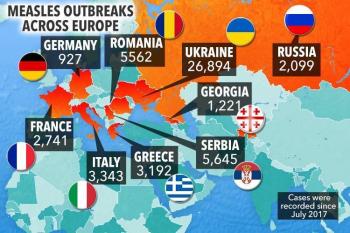Major study reinforces safety of MMR vaccine … and possible protection against autism
By Sarah Knapton
The MMR vaccine is linked to lower rates of autism, the largest ever study has shown, as parents were urged to ignore anti-vaccination campaigns and make sure their children had the jab.
The new study by Danish researchers  found children who had the measles, mumps and rubella vaccination were seven per cent less likely to be autistic than those who missed the injection.
found children who had the measles, mumps and rubella vaccination were seven per cent less likely to be autistic than those who missed the injection.
Although scientists warned the result was not great enough to demonstrate a protective effect, they said the science was now unequivocal that there is no link between the MMR jab and autism.
Lead author Dr Anders Peter Hviid, of the Statens Serum Institut, Copenhagen, said: “MMR is not associated with autism. I would say that this is very strong scientific evidence against an association.
“I think it is understandable that some parents are uncertain and concerned given the anti-vaccine stories that are easy to encounter on the internet. However, the science is clear, there is no link.”
Parents are urged to take up the offer of MMR vaccination for their children at 1 year of age and as a pre-school booster at 3 years and 4 months of age.
But there have been concerns about the jab since doctor Andrew Wakefield published a paper in The Lancet in 1998, suggesting a link to autism.
At the peak of the scare, one in five children missed out on the vaccination. The paper was later withdrawn and Dr Wakefield struck off after the research was found to be dishonest.
In recent years Public Health England (PHE) has reported a steep rise in cases of measles, with 913 laboratory confirmed cases between January and October last year compared with just 259 in 2017.
Many cases were teenagers and young adults who missed out on their MMR vaccine when they were younger.
Last week the head of the NHS, Sir Simon Stevens, warned that ‘fake news’ on social media has fueled a tripling in measles cases.
Mr Stevens said that parents who failed to get their children vaccinated were as irresponsible as if they failed to teach their children to look left and right before crossing the road.

For the new study, a nationwide cohort of 657,461 children born between 1999 and 2010 were followed to see if a link could be found between autism and the MMR jab. 6,517 were diagnosed during the study, a ratio of just under 1 per cent. But the chance of was slightly higher for those who had not had the jab.
There was also no more increased risk for children who had autism in the family, nor evidence of geographical clusterings of cases which would suggest the jab was having an impact.
Uptake of the MMR vaccine is now at 87.5 percent in Britain, making it short of the 95 per cent that the World Health Organisation target.
Commenting on the research, Helen Bedford Professor of Children’s Health at UCL Great Ormond Street Institute of Child Health said: “Parents deciding whether to have their child vaccinated should be reassured by this further evidence.
“The decision to immunise is important and I would strongly advise parents with questions or concerns about vaccines to speak with their GP, health visitor or practice nurse first rather than basing their decision on material they may have read on the Internet or social media. Such information is unregulated and misinformation is widespread.”
Dr Andrew Freeman, a reader in infectious diseases at Cardiff University added: “I think any study that debunks the erroneous link between MMR & autism is helpful, especially with the ongoing anti-vaxx lobby & continuing concerns with low MMR uptake.
“This is a large retrospective case control study – so the strengths are that it contains a large number of children diagnosed with autism, comparing those that had & those that hadn’t received MMR.
“It also studied children in specific higher risk groups for the development of autism (sibling with autism, low birth weight, older fathers or mother, smoking in pregnancy etc) & again found no increased risk with MMR in these groups.”
The research was published in the journal Annals of Internal Medicine.
At a Glance: MMR vaccine controversy
In 1998, respected medical journal The Lancet carried the results of a small-scale study (12 children) that claimed a link between the Measles Mumps Rubella (MMR) combined vaccine and autism and colitis in children.
The leader of the research team, Andrew Wakefield promoted mass media coverage of the study. MMR became the biggest science story of 2002 and the public’s confidence in the vaccine was seriously shaken and vaccination rates fell.
Concerned over MMR safety, organisations such as the NHS, the US Centers for Disease Control and Prevention and the Cochrane Library carried out large-scale epidemiological studies. These highlighted some adverse vaccine effects, such as rashes and joint pain, but could not replicate the findings of the original study.
In 2004, Sunday Times journalist Brian Deer revealed that, two years prior to the research, Wakefield had been hired by lawyers from the UK’s legal aid fund, who were hoping to prove that the vaccine damaged children. This undeclared conflict of interest led to The Lancet partially retracting publication of the study.
The study was fully retracted in 2010, after allegations that the study data had been falsified. At the same time, the General Medical Council found Wakefield guilty of serious professional misconduct, unnecessarily invasive tests on children and multiple, undeclared conflicts of interest. He was struck off the medical register.
The scientific consensus is that there is no causal link between the MMR vaccine and autism.
______________________
Credit: The Telegraph.co.uk





















